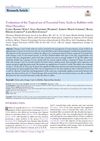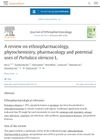8 citations,
July 2021 in “F1000Research” Plant-based compounds might be a promising alternative for prostate cancer treatment with fewer side effects.
 16 citations,
September 2018 in “Journal of Ethnopharmacology”
16 citations,
September 2018 in “Journal of Ethnopharmacology” Plant-based remedies may treat hair loss by reducing inflammation and improving insulin resistance.
 January 2020 in “Veterinary world/Veterinary World”
January 2020 in “Veterinary world/Veterinary World” The natural topical treatment improved rabbits' skin and hair condition.
 January 2021 in “Research journal for veterinary practitioners”
January 2021 in “Research journal for veterinary practitioners” The document does not determine if essential fatty acids improve rabbit skin health.
2 citations,
August 2022 in “Animals” Essential oils may improve dogs' health and melatonin can help with their sleep and anxiety, but both should be used carefully.
 57 citations,
October 2021 in “Journal of ethnopharmacology”
57 citations,
October 2021 in “Journal of ethnopharmacology” Indian herbal medicine shows promise for treating skin diseases but needs more research to prove effectiveness.
 14 citations,
April 2021 in “Biology”
14 citations,
April 2021 in “Biology” Thai rice bran extracts, especially from Tubtim Chumphae rice, can significantly reduce the activity of hair loss genes, with x-tocopherol showing potential as an anti-hair loss product.

Plant-based compounds can improve wound dressings and skin medication delivery.
 May 2023 in “Pharma innovation”
May 2023 in “Pharma innovation” Certain plant oils are good for heart health and weight control but need protection before use in foods.
1 citations,
March 2021 in “F1000Research” Plant-based compounds might be effective, low-side-effect treatments for prostate cancer by blocking a specific enzyme.
 June 2024 in “International Journal of Cosmetic Science”
June 2024 in “International Journal of Cosmetic Science” Plant oils like coconut, camellia, and safflower can penetrate hair, making it stronger and softer.
466 citations,
June 2009 in “Experimental dermatology” We now understand more about what causes acne and this could lead to better, more personalized treatments.
May 2024 in “Molecules/Molecules online/Molecules annual” Plant extracts can help prevent hair loss and promote hair growth.
 138 citations,
July 2015 in “Clinical, Cosmetic and Investigational Dermatology”
138 citations,
July 2015 in “Clinical, Cosmetic and Investigational Dermatology” Eating less sugar, milk, and saturated fats and more vegetables and fish may help treat and prevent acne.
 6 citations,
December 2020 in “Biological & Pharmaceutical Bulletin”
6 citations,
December 2020 in “Biological & Pharmaceutical Bulletin” Compounds from Eclipta prostrata L. plant have diabetes and obesity-fighting properties and reduce inflammation.
 December 2024 in “International Journal of Molecular Sciences”
December 2024 in “International Journal of Molecular Sciences” Linoleic acid is important for healthy skin and hair.
 38 citations,
January 2013 in “Analyst”
38 citations,
January 2013 in “Analyst” The study found that Ziziphus jujuba seeds contain beneficial compounds for treating insomnia and anxiety and that the methods used are effective for assessing their quality.
 5 citations,
September 2023 in “Journal of ethnopharmacology”
5 citations,
September 2023 in “Journal of ethnopharmacology” Purslane has many health benefits and potential uses in medicine, food, and farming.
March 2024 in “Molecules/Molecules online/Molecules annual” Enzymatically extracted bear oil has more unsaturated fats and significantly increases hair growth in mice.

Henna has many medicinal uses but needs more research to confirm its benefits.
 December 2024 in “Deleted Journal”
December 2024 in “Deleted Journal” Flaxseed can naturally smooth and improve hair health.
 8 citations,
May 2017 in “Current traditional medicine”
8 citations,
May 2017 in “Current traditional medicine” Stinging nettle has compounds that help with joint pain, arthritis, and prostate issues.
March 2024 in “Nutrients” Alopecia Areata is linked to specific gut bacteria and metabolites, indicating a complex gut microbiome.
 November 2024 in “Applied Sciences”
November 2024 in “Applied Sciences” Wild strawberry waste extract can be a sustainable cosmetic ingredient for treating acne and hair loss.
 21 citations,
April 2012 in “European Journal of Pharmaceutics and Biopharmaceutics”
21 citations,
April 2012 in “European Journal of Pharmaceutics and Biopharmaceutics” The gel with special fat-loaded particles from rice bran could be an effective skin treatment for hair loss.
 6 citations,
January 2011 in “Springer eBooks”
6 citations,
January 2011 in “Springer eBooks” Nutrition is important for skin health, and changing diet can help prevent and treat skin diseases.
 18 citations,
August 2014 in “Lipids”
18 citations,
August 2014 in “Lipids” Human hair has more unsaturated fats inside than on the surface, and certain lipids may help bind the outer and inner layers together.
 5 citations,
January 2003 in “Oilseeds and fats, crops and lipids/OCL. Oilseeds & fats crops and lipids”
5 citations,
January 2003 in “Oilseeds and fats, crops and lipids/OCL. Oilseeds & fats crops and lipids” Vegetable protein lowers cholesterol and protein deficiency can cause health issues.
 1 citations,
January 2010 in “Springer eBooks”
1 citations,
January 2010 in “Springer eBooks” Certain micronutrients may improve hair and nail health, but more research is needed to confirm their benefits.
 2 citations,
July 2018 in “Elsevier eBooks”
2 citations,
July 2018 in “Elsevier eBooks” Some supplements may help with hair loss, but there's not enough strong evidence to recommend them without doctor advice.






















